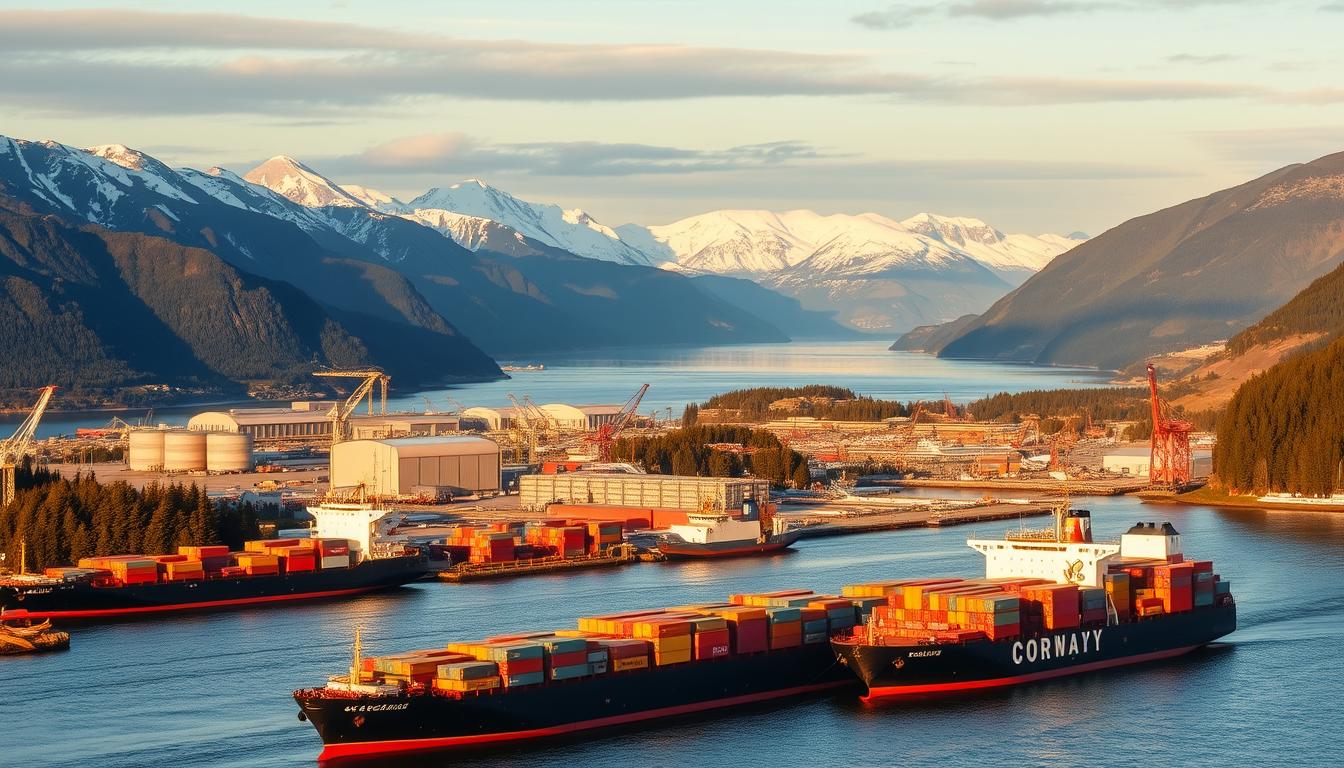Exploring Norway’s import and export scene reveals a bustling hub in the Norwegian trade market. The country’s economy is growing, and its location is strategic. This makes Norway a great place for businesses wanting to grow globally.
Understanding Norway’s market and its trade relations is key. It helps us find success in this booming sector. Doing business in Norway opens up new markets and builds valuable connections.
Understanding the Norwegian Market
To get into the Norwegian market, we must look at its key industries and economy. Norway has a lively economy with many sectors that shape trade. These sectors are important for imports and exports.
Key Industries for Import and Export
Norway’s economy is driven by several major industries. These industries draw in foreign trade. Here are the main ones:
- Marine Products: Norway is famous for its seafood, like salmon. This makes marine products a key part of its trade.
- Oil and Gas: Norway is a big player in Europe’s oil and gas sector. This sector drives economic growth and brings in a lot of money.
- Machinery: This includes manufacturing equipment and technology. It meets both local and global needs.
- Technology: Norway’s tech sector is growing fast. It offers chances for partnerships and investment.
Economic Climate in Norway
Norway’s economy is stable and attractive for trade. It has a strong currency, high incomes, and low joblessness. These factors make it a good place for businesses.
There’s also a growing demand for goods and a push for new tech and green practices. This makes Norway a great place for investment.
| Economic Indicator | Value |
|---|---|
| GDP Growth Rate | 2.5% |
| Unemployment Rate | 4.5% |
| Inflation Rate | 1.8% |
| Average Income | £41,000 |
These insights help investors understand the Norwegian market. Knowing about Norway’s industries and economy is key to success in this lively market.
Benefits of Importing Goods into Norway
Importing goods into Norway has many benefits for businesses. It offers a chance to enter the lively Norwegian market. With low tariffs and duties, the trading environment is very favourable. Knowing about tariffs and duties is key to making the most of this market.
Tariffs and Duties
Nations in Europe have different tariffs and duties for imports. But Norway has some of the lowest rates. This makes importing goods there very attractive.
Businesses can use these low tariffs to increase their profits. They can also offer better prices to customers. Knowing about these tariffs helps businesses plan and budget better.
Market Demand
The Norwegian market has a special mix of what people like to buy. This includes things like electronics, fashion, and health products. By matching imports with what Norwegians want, businesses can meet their needs well.
By watching and understanding these trends, importers can pick the best products. This way, they can succeed in this changing market.
| Commodity | Market Demand | Tariff Rate (%) |
|---|---|---|
| Electronics | High | 3.5 |
| Fashion Wear | Medium | 4 |
| Health Products | High | 3.0 |
Exploring Exporting Opportunities from Norway
Norway is a great place for businesses to start exporting. It has a strong economy and lots of natural resources. This makes it a good place to find products in high demand. We’ll look at some top sectors and the rules for exporting.
High-Demand Products
Seafood is a big deal in Norway’s exports. Salmon, cod, and shellfish are in high demand worldwide. Norway’s fishing is sustainable, which appeals to health-conscious buyers.
Renewable energy is also a key area. Norway leads in hydropower and wind energy. Minerals like petroleum and metals are also important exports, thanks to steady demand.
Export Regulations
Knowing the export rules is key for businesses in Norway. They need to get export licences and customs declarations. Understanding trade agreements helps cut down on tariffs.
Staying on top of these rules helps businesses grow in the global market.
Importance of Company Formation in Norway
Setting up a business in Norway involves several key steps. Forming a company is a must for those wanting to enter this market. It’s important to know the legal rules to follow and keep operations running smoothly.
Legal Requirements for Businesses
Business owners must follow certain legal steps when starting a company in Norway. They need to get permits, register for taxes, and meet reporting needs. The main tasks include:
- Registering with the Brønnøysund Register Centre
- Getting a Norwegian Organisation Number
- Following local health and safety rules
- Knowing about VAT based on what the business does
Types of Business Entities
Picking the right business type is key for entrepreneurs in Norway. Each type has its own benefits and downsides. Here are some common ones:
| Business Entity Type | Description | Liability |
|---|---|---|
| Sole Proprietorship | Simple structure, good for small businesses. | Unlimited liability; personal assets at risk. |
| Limited Liability Company (AS) | Most popular choice; limits owner liability. | Liability limited to capital investment. |
| Partnership | Collaboration of two or more individuals. | Varies; could be limited or unlimited liability. |
Our Nominee Services for Foreign Entrepreneurs
Foreign entrepreneurs looking to enter Norway’s market can find great support in our nominee services. We help you understand local rules and how to start trading. Our services make it easier to start and keep your personal info safe, all while following the law.
Benefits of Using Nominee Services
Using our nominee services has many benefits for foreign entrepreneurs. Here are some:
- Ease of Market Entry: Our services make it easier to get into the Norwegian market. This helps new business owners overcome challenges.
- Local Compliance Support: We help you follow Norwegian laws. This reduces the chance of legal problems.
- Confidentiality: We keep your personal info safe. We make sure you meet all the rules you need to follow.
How We Can Assist You
At LerriHost, we offer a wide range of services to help your business grow. We guide you on legal matters, help with paperwork, and keep you updated on market trends. Our team is here to help you succeed in Norway’s fast-paced economy.
Navigating Banking and Payment Processing in Norway
Starting a business in Norway needs a strong financial base. It’s key to understand banking well. We help entrepreneurs set up business bank accounts, following local rules.
Bank Account Setup for Businesses
To open a business bank account in Norway, you need some documents. Here’s what you’ll usually need:
- Proof of identity for all signatories
- Company registration details
- Business plan showing what your business does
- Financial forecasts and expected cash flow
Choosing a good bank is important. Banks like DNB, SpareBank 1, or Nordea are great. They offer services for businesses, including language help and banking guidance.
Payment Processing Solutions
Good payment processing is key for smooth transactions. Businesses should look at different solutions for secure and quick payments. In Norway, Vipps and Klarna are popular for mobile and online payments.
Choosing the right payment system is important. It can make customers happy, leading to more business and money. We suggest looking at fees, ease of use, and how well it works with your business.
Financial Services for Import and Export Businesses
In Norway’s fast-paced import and export scene, managing money well is key. We know all about financial services in Norway. This helps businesses like yours grow and follow local rules. We offer accounting help that fits the special needs of import and export companies.
Accounting and Bookkeeping Support
Good accounting is the foundation of any thriving business. We provide top-notch accounting support, including bookkeeping and financial reports. Our services make managing money easier, so you can concentrate on what you do best.
We’re experts in Norway’s accounting rules. This means we help you follow the law and work more efficiently.
Taxation Matters in Norway
Knowing about taxes in Norway is vital for businesses. Our team helps with VAT, corporate tax, and tax breaks. We keep you updated on tax laws and planning strategies.
This approach not only makes following the rules easier. It also boosts your profits.
SEO Solutions Tailored for Import and Export Businesses
For import and export businesses in Norway, having a strong online presence is key. A good digital marketing for businesses plan can attract buyers and partners. This drives growth. We need SEO strategies in Norway that fit the local market and boost visibility in a competitive world.
Importance of Online Presence
An effective online presence is the base for connecting with customers and stakeholders. Optimising our websites and content for search engines helps us reach more people. Businesses that are active online gain more brand awareness and customer loyalty. This leads to bigger chances in import and export.
Keyword Strategies for Success
Using the right keywords is vital for better search rankings. Adding relevant phrases to our content makes a big difference. We should aim for keyword optimisation that speaks to the Norwegian market, taking into account local language and preferences.
This targeted strategy helps us connect well with our audience. It ensures we grab their attention and encourage them to engage with us.
WordPress Design and Redesign Services
WordPress is a top choice for businesses wanting a strong online presence. It’s flexible, scalable, and easy to use. We provide top-notch WordPress services in Norway, meeting all your business needs.
Why WordPress is Ideal for Businesses
This platform lets us build sites that grow with your business. With many plugins and themes, we can tailor your website to meet your needs. Our WordPress design services give your business a solid base, making updates easy as you grow.
Customised Designs for Enhanced UX
User experience is key to keeping visitors and boosting sales. Our custom web designs follow the latest trends but keep your brand’s essence. We focus on making your site easy to use and visually appealing, ensuring it drives your business forward.
Maintaining Your WordPress Site
Keeping our WordPress site running smoothly is key. We must follow best practices to ensure reliability and a great user experience. A solid maintenance plan helps keep our site efficient and safe.
Best Practices for Site Maintenance
Keeping themes and plugins up to date is essential. It stops security issues and keeps things working well. Also, making regular backups is vital. We should keep these backups somewhere safe to avoid losing data.
- Implement a regular update schedule for all site components.
- Utilise reliable backup solutions to ensure data preservation.
- Monitor site performance to identify bottlenecks or issues early on.
Security Measures to Protect Your Site
Protecting our site from threats is a top priority. Using strong passwords and changing them often is a big part of our defence. Security plugins can also help spot and fix problems. And, enabling two-factor authentication adds extra security.
- Use complex passwords and change them frequently.
- Install security plugins to monitor activity and threats.
- Activate two-factor authentication for an extra layer of security.
WordPress Web Hosting Solutions
In today’s digital world, picking the right web hosting is key for better WordPress performance. We look at web hosting options in Norway, focusing on reliability, uptime, and performance. The right choice can make your website faster and more user-friendly.
Reliable Hosting Options for Your Business
Choosing a hosting provider that offers dependable services is vital for your online presence. Norway has several options for different business needs:
- Shared Hosting: A budget-friendly choice for startups and small sites.
- VPS Hosting: Offers better performance and reliability for growing businesses.
- Dedicated Hosting: Provides top control and reliability for big companies.
Performance and Uptime
Checking the performance and uptime of hosting is key for a smooth online experience. Hosts in Norway promise uptime from 99.9% to 100%. This is critical for keeping your site accessible to customers anytime. Also, consider these factors for the best WordPress performance:
- Server Location: Being close to users can speed up loading times.
- Caching Solutions: Good caching can make your site much faster.
- Customer Support: Great support can fix problems fast, keeping your site up.
Developing a Comprehensive Business Strategy
Creating a strong business strategy in Norway needs careful thought. We look at key factors that help businesses succeed. These include detailed market research, competitive analysis, and smart positioning strategies.
These steps help entrepreneurs make smart choices. They learn to adapt to local markets and stand out.
Steps to Create Your Strategy
To make a good business strategy, follow these steps:
- Do deep market research to find out what customers want and what’s new.
- Do a competitive analysis to see what your rivals are good at and where they’re weak.
- Define your unique selling point to show what makes your products or services special.
- Set clear goals that match your long-term dreams.
- Make a detailed business plan that outlines how you’ll put your strategy into action.
Understanding Local Competition
When planning for success, it’s key to understand the local competition. Knowing who you’re up against helps spot opportunities. We should look at:
- How big the market share is and where key players stand.
- How they price their products and what they offer.
- The strengths and weaknesses of other businesses.
- What customers think of these brands in our area.
Building Partnerships in Norway
In Norway’s competitive business world, forming strong partnerships is key to growth. Building good relationships in the local market opens up chances for working together. It also helps in successful networking.
Working with local groups lets us share resources and reach more customers. We can also come up with new ideas that fit what people in Norway like.
Networking Opportunities
Norway has many events, conferences, and trade fairs for businesses. These are great chances to meet new partners and customers. They help us grow in the market.
Being part of these events gives us access to important resources. We also learn about the latest trends in our industry.
Collaborating with Local Companies
Working with local companies has big advantages. We get to use their knowledge of the market and what people want. This helps us be more innovative and competitive.
By teaming up with local businesses, we make sure our ventures fit Norway’s unique market well.
Compliance and Regulations in Norway
In Norway, following the rules for imports and exports is key. Knowing the laws helps businesses stay legal and run smoothly. We’ll look at the laws that guide trade in Norway and why they’re important.
Understanding Import and Export Laws
Norway’s import and export laws cover many areas. They include tariffs, paperwork, and product standards. Following these rules helps with smooth trade and builds trust with others.
Staying true to these laws can also improve a company’s image. This is true both at home and abroad.
Keeping Up with Legal Changes
Businesses must keep up with changing laws. This is vital for those trading goods. Keeping an eye on updates to Norway’s compliance rules is essential.
We suggest using legal advice or industry groups to stay informed. Being quick to adapt to new rules helps businesses stay ahead and legal.
Case Studies of Successful Imports and Exports
Looking at case studies from Norway, we learn a lot from top companies in import export. These examples show us how to succeed and what problems to watch out for in global trade.
Learning from Industry Leaders
Big names like Orkla and Marine Harvest are great examples of success in import export. Orkla, a big player in fast-moving consumer goods, has done well by listening to what the market wants and working closely with local sellers. Marine Harvest shows how important quality is in seafood exports, using new tech for tracking and keeping things green. These stories from Norway teach us about the power of planning and putting customers first.
Common Challenges and Solutions
Even with success, companies face many hurdles. Issues like changing tariffs, different rules in each country, and cultural differences can be tough. Orkla deals with tariff changes by doing lots of research and building strong partnerships, making sure they follow the rules and get into new markets easily. Marine Harvest, on the other hand, uses local people to understand the culture better and improve how things work. These strategies help new players in the import export world overcome common problems.
| Company | Industry | Success Factors | Challenges Addressed |
|---|---|---|---|
| Orkla | Consumer Goods | Market Adaptation, Distribution Networks | Tariff Knowledge, Local Compliance |
| Marine Harvest | Seafood | Quality Control, Technology Utilisation | Cultural Understanding, Local Talent Investment |
Contacting LerriHost for Your Business Needs
Starting a business in Norway needs solid support. At LerriHost, we’re here to help. We know the challenges and chances in the Norwegian market. We aim to give you the advice and tools for your business to grow.
How to Reach Us
Looking for expert business support in Norway? Contact LerriHost through different easy ways. Call us at 07538341308, and our team will talk about your needs and offer custom solutions. We’re here to answer your questions and help with Norwegian rules.
We’re fully committed to supporting your business in Norway. Don’t wait to contact LerriHost today. We’re excited to work with you and help you make the most of this vibrant market.







